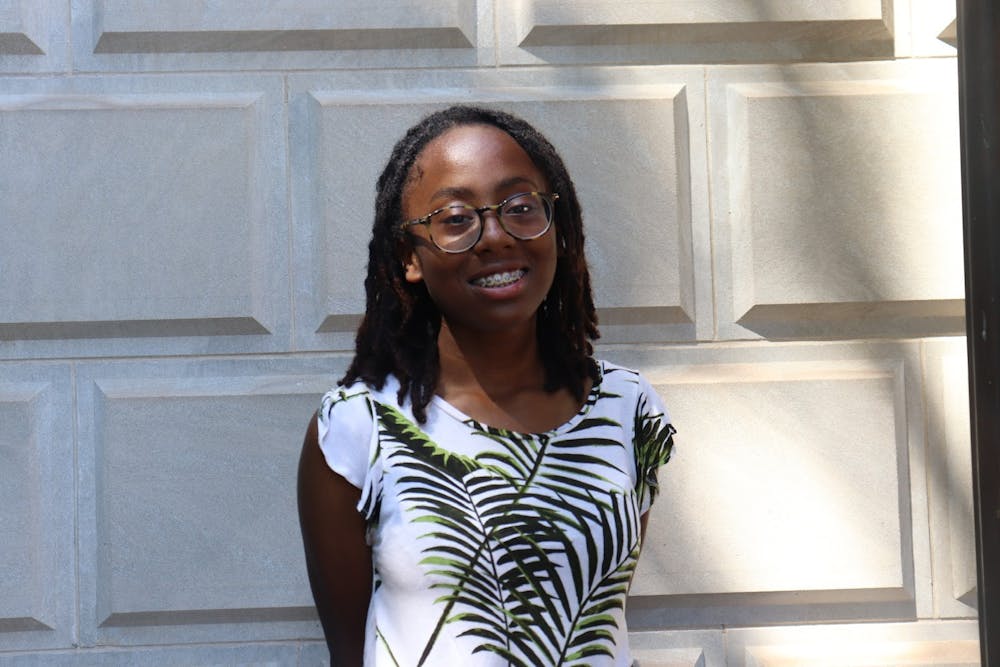Editor’s note: Images including racist language and profanity have been included at the author’s request.
On June 18, President Sylvia Burwell sent an email to the American University community announcing that the Juneteenth holiday will be added to the academic calendar and the University will be closed each year on June 19 starting in 2022. The University plans to mark this day annually with the community through programming and reflection.
Personally, the email announcement immediately brought up some questions. Why is a predominantly white institution, with an 8 percent Black student population, having a day off for a holiday that commemorates the end of slavery? Has the administration renamed the buildings named after slave owners yet? Is the University listening to the calls to defund AUPD and fulfilling the demands outlined by the “Hands Off Gianna” protesters? We cannot celebrate Black liberation while failing to make sacrifices to bring down the barriers that keep us from attaining that liberation.
Reading further into Burwell’s email, she included links to resources that the community had put together in the previous years for Juneteenth activities, such as a Q&A discussion with Sybil Roberts Williams, the director of African-American and African diaspora studies, and AU’s phase two plan towards “inclusive excellence.” The Goal 1 section of the plan lists an action step that states, “Support all faculty in using inclusive and antiracist teaching strategies to enhance classroom climate.” Reading this, I thought back to my previous School of Public Affairs professor, who explained that administration gives professors a syllabus template with the links to the University’s policies for diversity and antiracist resources and admitted that she doesn’t read them. I then reflected upon the AWOL article, which exposed the severe racism and tokenizing of BIPOC AUx staff and faculty that occurs behind-the-scenes. I pondered how professors haven’t yet implemented labor-based grading systems that wouldn’t favor those with a white, upper-class background while grading students lower for using African-American Vernacular English.
Outside of the classroom, both the University and its students provide little to no safe space for BIPOC students, especially those who challenge AU’s culture. In a Q&A discussion with Nickolaus Mack, a former Opinion Managing Editor for The Eagle, he discussed in his column about Founders Day being a celebration of a slave owner and how the community responded. Within the interview, he explained that the student body reacted negatively to the article. His name was blacklisted from the Founders Day Ball that year and he was told if he were to attend, he would be confronted. He received cruel hate mail in his inbox, which included being told to jump off a bridge. The University gave him no protection against this response.
I share a similar experience. On Feb. 21, The Eagle had published my article, “Mid-Semester Residential Experience could enforce settler colonialism,” which highlighted my worries of AU students entering D.C. 's vulnerable, predominantly Black city en masse and harming the existing population. Within 24 hours, Young America’s Foundation, a conservative publication, published a critique of my article and several other publications followed. The reaction to the article went as far as Former Wisconsin Governor Scott Walker tweeting about it. Though it had sparked much needed thought-provoking conversations within the AU community, the hate mail and death threats I received exposed the white fragility that is simultaneously present. The messages I received, many of them anonymous, ranged from being called a “ghetto rat,” think pieces that invalidate my experiences and being blamed for “allowing” racism to affect my life. I reached out to the Title IX office to receive some form of support, but I was redirected to the AUPD, the same organization that is in close relationship with the MPD, which has enacted police brutality and controversy. No reasonable options were available to me and the students who doxxed me to the conservative publications weren’t held accountable.
No amount of reading lists and Zoom webinars can make up for the trauma that myself and other Black students have faced while attending this University. Attempts to work alongside with administration have led to either students not being able to contribute much to the conversation or a lack of updates or movement with proposed anti-racist projects, such as the Slavery Working Group. As Mack quoted in the Q&A, “...a lot of the things that happen at universities and American University in particular is that when a student graduates, that work kind of ends right there.”
These “anti-racist” action items that the University implemented into its curriculum and culture have failed to create any substantial allies or anti-racists. Instead, they created a culture of uncontested social and political performativity and groomed more benevolent self-aggrandizing white peers, who have the audacity to speak over BIPOC voices in racial discussions.
To the administration: we don’t need a day off from classes to allow my white peers to partake in drunken recreational activity. We aren’t asking for you to undergo passive reflection of past actions through optional workshops. We need you to stop dodging the uncomfortable conversations that affinity groups and student leaders are trying to have with you and address our concerns with priority. We are ready when you are.
Kayla Kelly is a sophomore in the School of Public Affairs and a columnist for The Eagle.





